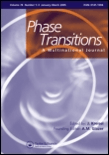
PHASE TRANSITIONS
Scope & Guideline
Transforming Understanding of Material Behaviors
Introduction
Aims and Scopes
- Phase Transitions in Materials:
The journal emphasizes the exploration of phase transitions in different materials, including ceramics, metals, and polymers, detailing the mechanisms and thermodynamics involved. - Multiferroics and Magnetoelectric Materials:
A significant area of focus is the study of multiferroic materials and their phase transitions, which have implications for magnetoelectric applications and devices. - Computational and Theoretical Studies:
The journal promotes research utilizing computational methods and theoretical frameworks to predict and analyze phase behavior and transitions, enhancing the understanding of complex systems. - Dielectric, Magnetic, and Thermal Properties:
Investigations into the dielectric, magnetic, and thermal properties of materials during phase transitions are a core element, providing insights into their functional characteristics. - Nanostructured and Composite Materials:
The journal includes studies on nanostructured and composite materials, exploring how phase transitions are influenced by size effects and interfaces. - Experimental Techniques and Characterization:
Research that employs advanced experimental techniques for the characterization of phase transitions, such as spectroscopy and microscopy, is prominently featured.
Trending and Emerging
- Nanomaterials and Size Effects:
There is an increasing focus on how nanoscale dimensions influence phase transitions, with research delving into size-induced effects and their implications for material properties. - Interfacial Phenomena:
Studies examining interfacial phenomena during phase transitions are on the rise, particularly in composite materials, as these aspects play a critical role in determining overall material behavior. - Machine Learning and AI in Phase Transition Studies:
The integration of machine learning and artificial intelligence methods to predict and analyze phase transitions is emerging as a prominent trend, enhancing the efficiency and accuracy of research. - Hybrid Materials and Multi-Functional Applications:
Research on hybrid materials that exhibit multiple functionalities through phase transitions is gaining traction, focusing on their potential applications in electronics and energy storage. - High-Pressure Phase Transitions:
There is a growing interest in studying phase transitions under high-pressure conditions, which can lead to novel material properties and behaviors not observable at ambient conditions.
Declining or Waning
- Traditional Solid-State Phase Transitions:
There has been a noticeable decline in papers focusing solely on classical solid-state phase transitions, possibly due to the growing interest in more complex and novel materials. - Liquid Crystal Studies:
Though liquid crystals remain a relevant topic, the frequency of publications specifically addressing traditional liquid crystal phase transitions has decreased, indicating a shift towards more innovative applications. - Thermal Properties Alone:
Research centered solely on thermal properties of materials without a direct connection to phase transitions has become less common, as studies increasingly integrate multiple property analyses. - Basic Thermodynamic Models:
The use of basic thermodynamic models to explain phase behavior has diminished, with a trend towards more sophisticated modeling techniques and simulations.
Similar Journals
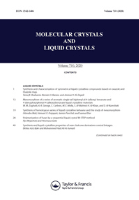
MOLECULAR CRYSTALS AND LIQUID CRYSTALS
Decoding the Dynamics of Molecular OrganizationMOLECULAR CRYSTALS AND LIQUID CRYSTALS is a distinguished journal published by Taylor & Francis Ltd, dedicated to the comprehensive examination of the structural and physical properties of molecular crystals and liquid crystals, with applications spanning fields such as chemistry, materials science, and condensed matter physics. Established in 1972, this journal has carved out a niche in the academic landscape despite facing recent challenges, as reflected in its current quartile rankings of Q4 across multiple categories in 2023. The journal not only serves as a platform for groundbreaking research but also invites contributions that further explore the intricate relationships between molecular organization and material properties, thereby advancing our understanding of these fascinating substances. With a commitment to fostering scientific dialogue, MOLECULAR CRYSTALS AND LIQUID CRYSTALS aims to reach a broad audience of researchers, professionals, and students, providing insights that are pivotal in driving innovation in materials research.
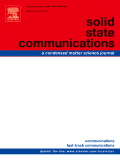
SOLID STATE COMMUNICATIONS
Exploring the Frontiers of Solid-State ScienceSOLID STATE COMMUNICATIONS is a prestigious journal published by Pergamon-Elsevier Science Ltd, dedicated to disseminating cutting-edge research in the fields of Chemistry, Condensed Matter Physics, and Materials Chemistry. With an ISSN of 0038-1098 and an E-ISSN of 1879-2766, the journal has established itself as a vital resource for researchers and professionals seeking to explore the fundamental properties and innovative applications of solid-state materials. As of 2023, it boasts a commendable standing, ranking in the Q2 quartile across its various categories, reflecting its impactful contributions to the scientific community. The journal is indexed in Scopus, further validating its relevance and quality, with notable ranks close to the median percentile in key areas. While SOLID STATE COMMUNICATIONS does not currently offer Open Access options, it remains a highly regarded source for rigorous scientific inquiry and open discussions, with a publication history dating back to 1963 and continuing to 2024. The journal serves as an essential platform for disseminating groundbreaking findings and fostering collaboration within the vibrant fields of solid state science.
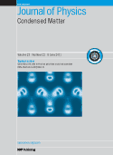
JOURNAL OF PHYSICS-CONDENSED MATTER
Advancing the Frontiers of Condensed Matter Physics.JOURNAL OF PHYSICS-CONDENSED MATTER, published by IOP Publishing Ltd, stands as a premier platform for the dissemination of impactful research in the fields of condensed matter physics and materials science. Since its inception in 1989, this journal has successfully bridged the gap between fundamental and applied research, delivering cutting-edge findings pertinent to both the academic community and industry professionals. Ranking in the Q2 category for both Condensed Matter Physics and Materials Science, it holds a respectable position within the scientific community, as evidenced by its Scopus rankings. With a commitment to fostering innovative research and promoting open dialogue, the journal offers a substantial collection of articles that contribute to the evolving landscape of materials science and physics. Researchers and students are encouraged to engage with the journal’s rich content, which not only enhances their academic pursuits but also plays a crucial role in advancing technologies based on solid-state materials.

Uspekhi Fiziki Metallov-Progress in Physics of Metals
Driving Discoveries in Physics of MetalsUspekhi Fiziki Metallov - Progress in Physics of Metals, published by the G V KURDYUMOV INST METAL PHYSICS NAS UKRAINE, is a distinguished open-access journal that has been advancing the field of metal physics since 2000. With an ISSN of 1608-1021 and E-ISSN of 2617-0795, this journal is pivotal for disseminating rigorous research findings and innovations across diverse subfields including Condensed Matter Physics, Electronic, Optical and Magnetic Materials, and Fluid Flow and Transfer Processes. The journal's strong impact, reflected in its Q2 and Q3 quartile rankings across several categories and a commendable Scopus ranking, places it at the forefront of materials science and engineering. Researchers, professionals, and students can benefit from its rich repository of high-quality articles aimed at fostering knowledge and collaboration in metal physics. With an accessible repository and commitment to the open-access model, Progress in Physics of Metals strives to make significant contributions to the global scientific community, shaping the future of metal-based research.
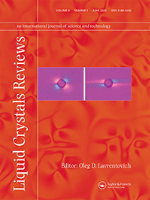
Liquid Crystals Reviews
Advancing Knowledge in Liquid Crystal TechnologyLiquid Crystals Reviews, published by Taylor & Francis Ltd, is an esteemed journal dedicated to the nuanced field of liquid crystal technology and its applications. With an ISSN of 2168-0396 and an E-ISSN of 2168-0418, this journal has established itself as a vital resource for researchers, professionals, and students alike, providing a platform for rigorous peer-reviewed articles and innovative research findings. Impressively, it holds a Q1 ranking in Chemistry, Condensed Matter Physics, and Materials Science as of 2023, underscoring its significance in these disciplines. The journal spans a convergence period from 2013 to 2024, inviting high-quality contributions that lead to foundational advancements in understanding the properties and uses of liquid crystals. While the journal is not open access, its impact on the scientific community is profound, serving as a cornerstone for knowledge dissemination and advancement in liquid crystal research. Located in the United States with its publishing office in England, Liquid Crystals Reviews operates at the crossroads of innovation and academic excellence.

Condensed Matter
Unlocking the Secrets of the Physical WorldCondensed Matter is a leading open-access journal dedicated to the diverse and dynamic field of condensed matter physics, published by MDPI since 2016. With its base in Switzerland, the journal aims to present a platform for researchers and professionals to share innovative findings and advancements in areas such as electronic, optical, and magnetic materials. As of 2023, it is ranked in the Q3 category for both condensed matter physics and electronic, optical, and magnetic materials, a testament to its relevance and growth within the scientific community. Researchers will find valuable insights through its accessible format, fostering collaboration and knowledge dissemination within this interdisciplinary field. With a commitment to enhancing the global dialogue in condensed matter studies, Condensed Matter invites contributions that explore theoretical and experimental approaches, thus pushing the boundaries of understanding in this crucial area of science.

Journal of Superhard Materials
Empowering researchers through cutting-edge findings in superhard materials.The Journal of Superhard Materials, published by PLEIADES PUBLISHING INC, is a premier journal dedicated to advancing the field of superhard materials, including their synthesis, properties, and applications. With an ISSN of 1063-4576 and E-ISSN 1934-9408, this journal serves as an essential resource for researchers and professionals focused on material science and inorganic chemistry. As of 2023, it ranks in the Q3 category for both Inorganic Chemistry and Materials Science (miscellaneous), establishing its growing significance within the scientific community. The journal, located in the United States at PLEIADES HOUSE, New York, welcomes submissions that contribute innovative findings in the realm of superhard materials, fostering collaboration and knowledge exchange among scholars. Researchers interested in cutting-edge developments and applications in this niche area will find valuable insights and findings published in this journal, encouraging continued exploration and discovery in the materials sciences.

Letters on Materials
Advancing materials science through innovative insights.Letters on Materials, published by the Russian Academy of Sciences, Institute of Metals Superplasticity Problems, serves as a vital platform in the diverse field of materials science. Established in 2014 and running through 2024, this journal has carved a niche as a Q3 category publication, focusing on innovative research and developments in materials science and engineering. With its ISSN 2218-5046 and E-ISSN 2410-3535, it provides a unique opportunity for researchers and industry professionals to disseminate significant findings and theoretical advancements within the materials domain. While currently not categorized as open access, the journal maintains a global reach, promoting scientific dialogue and collaboration particularly within the Russian Federation and broader international audiences. Its placement within the 25th percentile in the Scopus rankings underscores its emerging significance, making it essential reading for anyone interested in cutting-edge materials research.
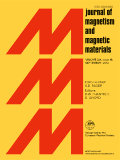
JOURNAL OF MAGNETISM AND MAGNETIC MATERIALS
Unveiling the Science of MagnetismJOURNAL OF MAGNETISM AND MAGNETIC MATERIALS, published by Elsevier, stands at the forefront of research in the fields of magnetism and magnetic materials. With an established history since 1975 and a commitment to advancing knowledge through rigorous peer-reviewed studies, this journal has become a valuable resource for researchers and academics alike. Housed in the Netherlands and indexed under Scopus, it ranks Q2 in both Condensed Matter Physics and Electronic, Optical and Magnetic Materials, reflecting its impact within these domains. The journal aims to disseminate innovative research findings, methodologies, and reviews pertaining to magnetic phenomena, thus facilitating significant advancements in applications ranging from data storage technologies to medical imaging. While the journal does not feature open access options, it remains a vital part of the scientific dialogue, showcasing content that attracts a diverse audience, including researchers, professionals, and graduate students dedicated to enhancing their understanding of magnetism in various materials.

PHYSICS AND CHEMISTRY OF MINERALS
Advancing Insights into Mineral InteractionsPHYSICS AND CHEMISTRY OF MINERALS, published by SPRINGER, is a premier journal dedicated to advancing the understanding of the physical and chemical properties of minerals, their interactions, and their significance in various geological processes. With an ISSN of 0342-1791 and an E-ISSN of 1432-2021, this journal serves as a vital resource for researchers and professionals in geochemistry and petrology, as well as materials science. Reflecting the journal's commitment to quality scholarship, it has achieved Q3 rankings in both Geochemistry and Petrology, and Materials Science (miscellaneous) categories. Established in 1977 and continuing through 2024, the journal has consistently provided a platform for high-impact research, fostering collaboration and innovation in the field. Located in Germany and reaching a global audience, PHYSICS AND CHEMISTRY OF MINERALS is instrumental for students, academics, and industry experts looking to stay at the forefront of mineral research and applications.